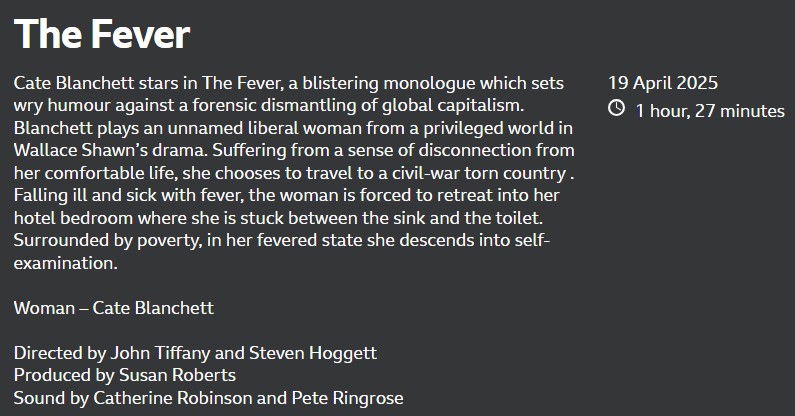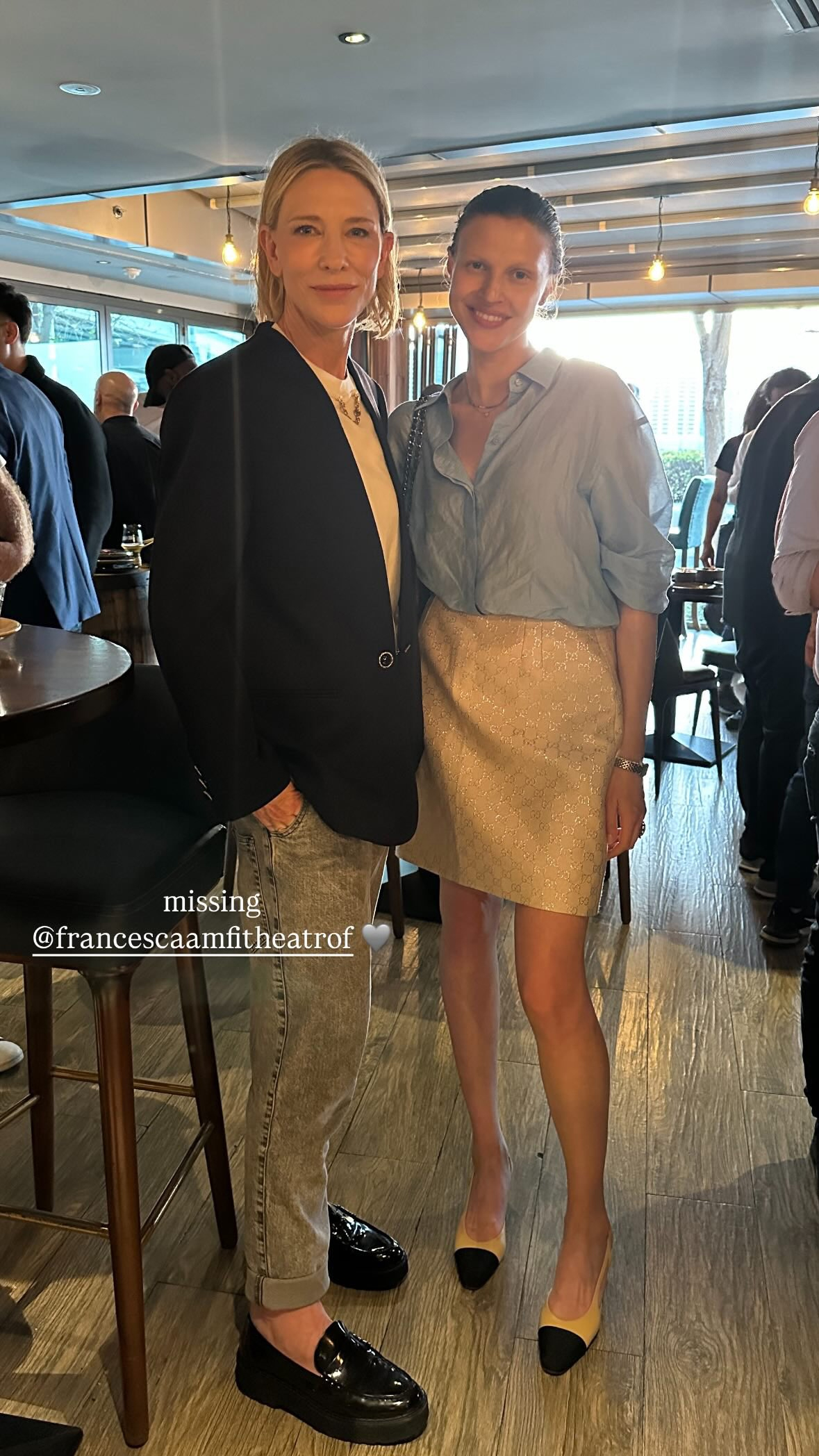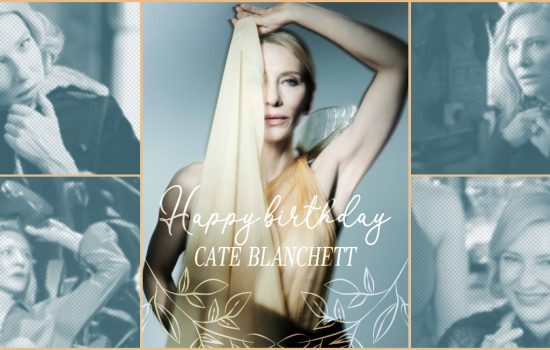Cate Blanchett’s first major radio drama, The Fever by Wallace Shawn, is now available to listen to on BBC Sounds. Cate was interviewed for BBC Radio 4 programme PM and Radio Times to promote the radio drama.
The short film, BOZO OVER ROSES, written and directed by Matthew Sidle is part of the International – Fiction III lineup of Psarokokalo International Short Film Festival (Greece). The festival runs from 10-17 July 2025. It first screened at International Rotterdam Film Festival in February 2025.
ALPHA GANG by the David and Nathan Zellner is about to start production in May according to one of the producers, Mary Aloe, and Budapest Reporter. Cate leads the film as Alpha One, the leader of alien invaders disguised as 1950s leather-clad biker gang, dubbed the Alpha Gang. They are ruthless in their mission, until they succumb to the most toxic and contagious human condition of all: emotions.
There is new interview ahead of BLACK BAG release in Italy on 30 April.
Cate attended the opening teamLab Phenomena in Abu Dhabi on 16 April. She’s previously visited another teamLab exhibition in Tokyo last year.
The Fever
You can listen to her interview with BBC Radio 4 PM here, around 23:39 mark.
Parts of the interview with Radio Times
“Cate Blanchett,” says Cate Blanchett after I ask her to introduce herself for the benefit of the tape. “Actress.”
“You had to think about that,” says the man sitting beside her, theatre director John Tiffany. “I did, didn’t I?” Blanchett replies. “It’s because I’m giving up.”
Giving up?
“My family roll their eyes every time I say it, but I mean it. I am serious about giving up acting.” There are, she says, “a lot of things I want to do with my life”.
Hopefully not immediately. We are, after all, sitting in Blanchett’s dressing room at the Barbican in London where she is seven performances away from the end of an applauded run of Chekhov’s The Seagull, in which the Australian two-time Oscar winner plays the faded, jaded actress Arkadina.
On the dressing room door, a piece of A4 paper bears the legend “CB” in a 50-point font while the view from the dressing window is of the Brutalist Barbican’s multi-storey car park. Glamorous it is not. But still Blanchett sits, amid the mundanity, looking lit from within. Like you hope a movie star would.
She also looks a bit distracted. Absent, almost. She doesn’t love doing interviews. “No one is more boring to me than myself and I find other people much more interesting,” she says. “I find myself profoundly dull.”
Later, I’ll ask her if she agrees with the author John Updike who said that “celebrity is a mask that eats into the face” and she’ll reply: “When you go on a talk show, or even here now, and then you see soundbites of things you’ve said, pulled out and italicised, they sound really… loud.” She wrinkles her nose. “I’m not that person.”
So what sort of person is she? Restless, she says. “I make more sense in motion – it’s been a long time to remotely get comfortable with the idea of being photographed. I’ve always felt like I’m on the periphery of things, so I’m always surprised when I belong anywhere. I go with curiosity into whatever environment that I’m in, not expecting to be accepted or welcomed. I’ve spent a lifetime getting comfortable with the feeling of being uncomfortable.”
Of her life, Blanchett says, “Like a lot of people, I like being alive. I throw myself into life, often in unwanted places. Maybe that’s why my career, if you call it a career, has been so strangely eclectic.” (Note to Ms Blanchett: you can definitely call it a career.)
What Blanchett hadn’t done hitherto was any radio drama, despite the place and spaces that radio occupies in her life.
“I’m obsessed with the psychological space that is the interior of people’s cars,” she says. “Often the most profound and intense and memorable conversations that I have with my children are in the car. There’s a psychological cone, a collective cone, when you’re all travelling together. It’s the songs you sing on the way on holiday, the stories and the jokes you tell – and the radio you listen to. That special space was where my 16-year-old encountered Desert Island Discs and now he’s completely obsessed with it, and, because the school run is quite long, it’s where I listen to long-form radio drama.”
If she ever watched or listened to her own work – which she doesn’t – Blanchett could, this Saturday, listen to The Fever by Wallace Shawn. Directed by John Tiffany, winner of two Tonys and two Oliviers, and his frequent collaborator Steven Hoggett, The Fever is a 90-minute monologue in which an unnamed traveller (Blanchett) falls ill in a foreign country riven by civil war. Racked with fever, she comes to realise that her developed-world comfort and privilege are paid for by the suffering and oppression of those in the developing world. It is a brutal, beautiful denunciation of global capitalism in which we are all complicit.
“When I first heard it, I felt ambushed by it,” she says. “Urgent and demanding, a dialogue with the self that asks some rather uncomfortable questions. It’s also incredibly intimate, which makes it perfect for radio.”
Blanchett says her character “gives voice to an inner monologue that I think a lot of us are ashamed to say we have,” arguing that shame can be incredibly useful. “There are lots of things that I am ashamed to admit, even to myself, even to my inner voice, but if we act on and confront what we are ashamed about, then we can continue to grow.”
She sounds hopeful. “I am hopeful,” she declares. “But when empathy is being described as a negative [as Elon Musk did last month], we are in deep trouble.”
So how does she stay hopeful? “I have four children,” she says, plainly. “There’s no time for hopelessness. I’m not being Pollyanna-ish, nor am I saying I have the answers, but we have to preserve the spaces where we can find common ground and talk to one another and not submit to fear. Fevers break.”
Blanchett is under no illusions about the potential impact of The Fever. As the traveller herself says, “Artists who create works of art that inspire sympathy and good values don’t change the life of the poor.”
The actress herself says, “It’s a conversational opener. If one person has an epiphany? Amazing. But sometimes these things come, like it did with me, at 3am two weeks after I’d read it. I was up all night. Why am I thinking about this? Why? And I kept going back to it…”
Is she ready for the “Who does Cate Blanchett think she is?” backlash that may come when sections of the media take umbrage at someone famous denouncing the system that made them famous? “When I start speaking in a defensive way like that, it’s because I’ve been affected by something and I don’t want to look at it. One expects it with a piece like this.” She shoots me a steely look.
Oh, Cate Blanchett, actress (for now anyway) is ready for whatever comes.
Full interview is on Radio Times, the 19-25 April issue is also out today!
Review
An unnamed but clearly Western, relatively wealthy traveller lies feverish on the bathroom floor of a hotel in a country where violence is breaking out and an unnamed man is being executed by lethal injection. Alive to the physical beauty of this unhappy place, the person falls into a series of memories and self-reflections that reveal a darker thought process beneath the surface and an unwillingness to really challenge the status quo.
The big draw here is a rare appearance on radio for star Cate Blanchett, who finely judges the balance between compassion and narcissistic self-interest within the protagonist as an excavation of their views reveals opinions and degrees of antipathy that seem to surprise the character as they emerge. And fans of the actor will enjoy the expert control she exerts over the most intimate medium in a story with no other performers to rely on, just the speaker alone, creating scenarios, characters and folding out the day-to-day impressions of a single privileged life within the broader context that Shawn creates.
The opportunity to hear Blanchett command such attention in this skilful transition to radio comes within a month of equally compelling turns on stage in The Seagull and on screen with Black Bag, a testament to her versatility, particularly here in The Fever where pacing, emphasis and control of the narrative layers is so vital to the success of the adaptation.
So come for Blanchett but stay for Shawn’s absorbing and evocative writing that, though more than 30 years old, seems fitted to proximity of radio. The structure is strong enough to guide the listener through these different levels as Shawn mixes memories of childhood buns from the local bakery and how values were instilled with adult interactions, the violent civil wars happening beyond the bathroom walls and the philosophical conclusions on human behaviour that explain why the world never truly changes, and why economic and cultural inequalities persist.
The Fever is quite tightly woven with segments that recur, but inevitably, your attention will drift occasionally over a relatively long piece. Yet the control of characterisation is high quality, slowly revealing someone who thinks they are good but finds a true and shockingly complacent identity in their existing, comfortable life. It will leave you wondering if your bleeding heart really wants to save the world after all.
Full review on The Reviews Hub
Bozo Over Roses
View this post on Instagram
Black Bag
Parts of the interview Google translated from Italian to English.
“I agreed blindfolded. Written by David Koepp, directed by Steven, that’s all I needed. The film is funny and, I hope, romantic. I also think it captures the spirit of the times, it makes us reflect on how difficult it is to trust people and have lasting relationships.”
The black bag of the title is a defence for spies, a limit that others cannot cross. Does it also apply to ordinary people?
“A spy does not reveal what is in their briefcase, not even to their partner. Kathryn and George are everything to each other. Passion for their work and mutual trust are their compass. The film plays on ambiguity, but suggests that each of us would do well to keep some sort of bag of secrets to protect our relationship.”
Would you be a good spy?
“Who knows. They are good listeners, in that I recognise myself. People tell more things than you imagine. It fascinates me how they move on the razor’s edge between morality and amorality. They cannot have limits because they know they will have to cross them. The six of them know each other well but everyone has secrets to defend.”
Two Oscars, eight nominations, revered by directors and colleagues who consider you a legend, an inspiration. How does that make you feel?
“When people compliment me, I feel like they’re talking about someone else. I’m happy, but I don’t feel like an example. In fact, I find myself thinking about how I could have done better, or I find myself toying with the idea of ??quitting.”
Instead, you have an impressive filmography that is constantly being updated: you are in new Jim Jarmusch film and ‘Alpha Gang’ about an alien invasion.
“The most interesting roles are not necessarily the ones with the most lines. I look for projects of different sizes and ambitions, different styles, actors and directors. As an actress that’s what refreshes you: using even the muscles you don’t know. That’s the reason why, so far, I have continued.”
You are fresh from a triumphant Chekhov at the Barbican in London.
“With The Seagull. Twenty years ago I did Nina, now Irina Arkadina. A beautiful trajectory. Not being Russian, I don’t start from the original text. Each time it’s an adaptation, even my husband has also done many. This version by Thomas Ostermeier is different from all of them, like a mirage. I like theatre, you are part of a group, you drop certainties, you accept embarrassments right from the rehearsal room.”
In January in Rotterdam, you launched the Displacement Film Fund, to finance works by refugee filmmakers. The first five names will be announced at Cannes. Can cinema make a difference?
“It can bring you into the reality of someone’s life like no other art form. That is the spirit of this initiative. When people have to leave their homes, they lose access to the most basic things, but as artists they also lose access to the means to create, at a time when it is more vital than ever.”
Full interview on Corriere.
teamLab Phenomena
Saadiyat Cultural District lit up with a constellation of global stars gathered for the exclusive VIP opening of teamLab Phenomena Abu Dhabi, the emirate’s newest cultural landmark where art, technology and imagination meet in extraordinary ways.
Among the guests of honour were Hollywood celebrities Cate Blanchett, Brendan Fraser and Andrew Garfield, Marvel star Pom Klementieff and DC Comics Grant Gustin, Stranger Things’ Natalia Dyer, music icon Swizz Beatz, spiritual leader Sadhguru and experimental music producer Flying Lotus.
The renowned personalities joined creatives, leaders and visionaries from around the world to mark the launch of teamLab Phenomena Abu Dhabi.
Visitors are invited to discover the ever-changing, immersive artworks that respond to their movement and presence, inviting them to explore, connect and create while ensuring that no two visits are the same.
Located in the Saadiyat Cultural District, home to Louvre Abu Dhabi and other world-class institutions, the opening of teamLab phenomena Abu Dhabi further strengthens Abu Dhabi’s position as a leading destination for arts and culture.




View this post on Instagram
Source: PR Newswire





 A Manual for Cleaning Women (202?)
A Manual for Cleaning Women (202?) Father Mother Brother Sister (2025)
Father Mother Brother Sister (2025)  Black Bag (2025)
Black Bag (2025)  The Seagull (2025)
The Seagull (2025) Bozo Over Roses (2025)
Bozo Over Roses (2025) Disclaimer (2024)
Disclaimer (2024)  Rumours (2024)
Rumours (2024)  Borderlands (2024)
Borderlands (2024)  The New Boy (2023)
The New Boy (2023) 











